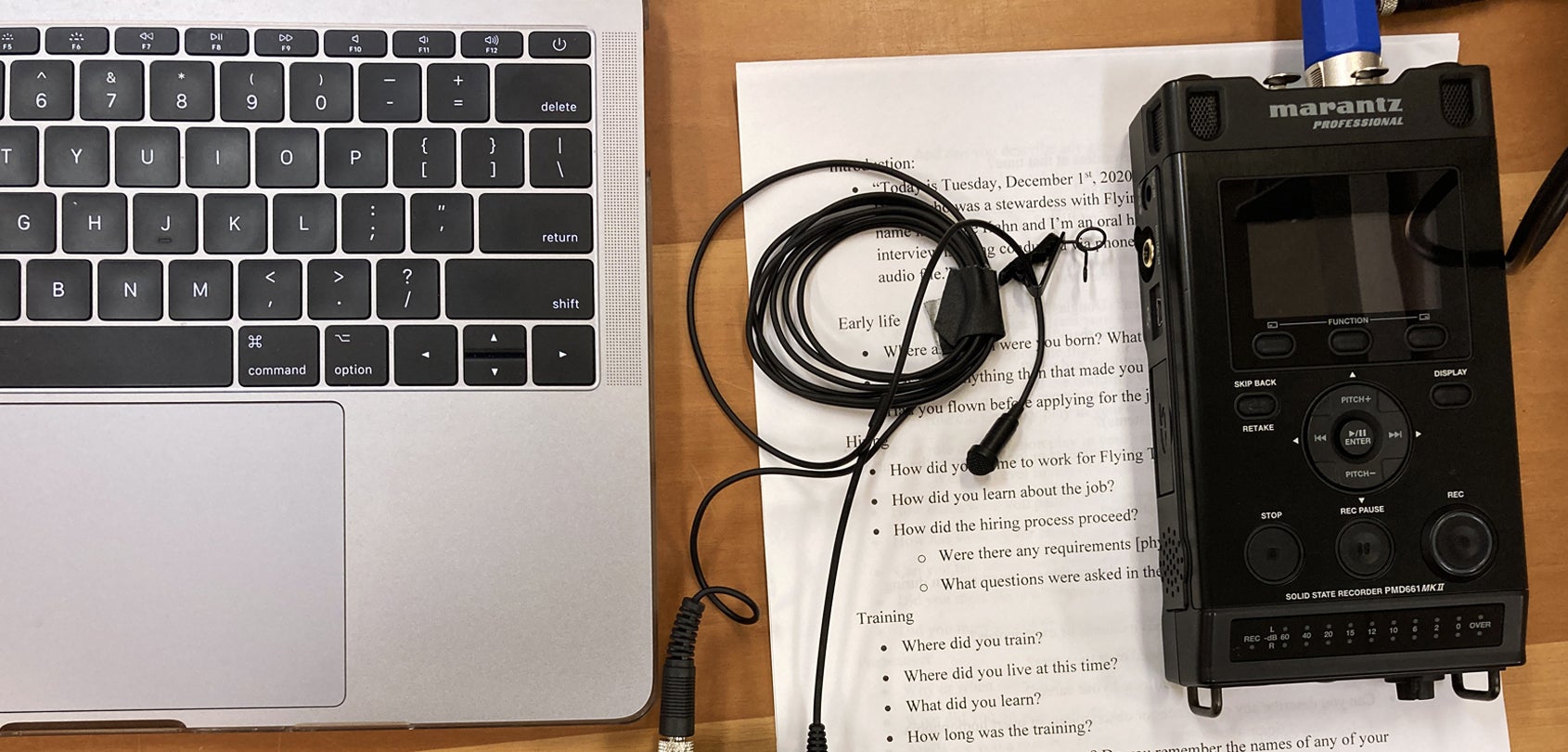
Oral History Program Records 100 Interviews
SFO Museum’s Oral History Program (OHP) has reached a milestone, having recorded its 100th interview.
In 1997, the OHP began recording the career histories of flying boat captains, early stewards and stewardesses, and other early commercial aviation figures who were living in the San Francisco Bay Area. Most of the people had worked for Pan American World Airways, United Airlines, and Trans World Airlines (TWA).
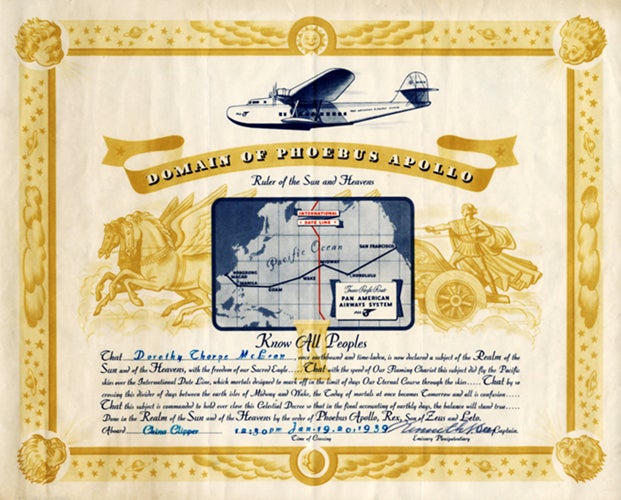
[image]
Certificate signed by Captain Kenneth W. Beer 1939
Kenneth Beer began his career with Western Air Express in 1928 and flew for Pan American Airways beginning in 1929.
Captain Beer was interviewed by the OHP in 1997.
“We first flew from San Francisco Bay across to Honolulu. The airplane could make it, if the wind wasn’t against them, with some passengers and some mail. But if they had headwind, then we had to start cutting down on our payload. Mail had the priority: mail, passengers, and other cargo. There were times when the wind was so unfavorable they didn’t start. But always, the early trips, the meteorologists calculated what the wind would be, and what the length of the flight would be. And more than once, we figured out that it was marginal. So we would go as far as it was safe. As I put it, we were approaching half our gas, and we hadn’t had half of our trip; we’d better come back.”
Since then, the collection has grown to include the experiences of people who worked in the modern era in many different roles and at many different airlines. The OHP actively seeks out the experiences of people of color, LGBTQ individuals, women working in nontraditional roles, and a variety of different roles.
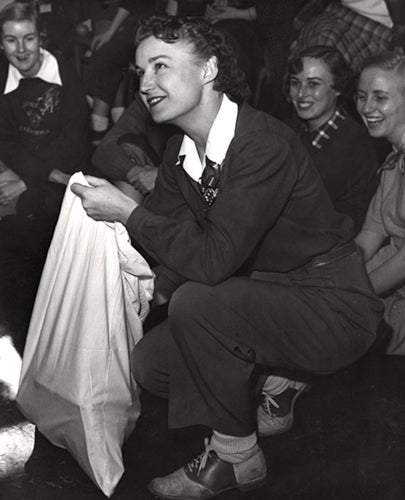
[image]
United Air Lines flight attendant Edith Lauterbach with her colleagues 1953
Edith Lauterbach was instrumental in establishing the Air Line Stewardesses Association, now known as the Association of Flight Attendants.
Ms. Lauterbach was interviewed in 2003.
“I was a secretary and I wasn't doing anything very vital, and I was making more money than when I started to fly. I took a cut in pay. And actually, the airlines had never raised stewardesses' salaries because it was considered a glamour job and people wanted it and they applied for it, and so they didn't have to. We began to realize that we were being asked to do all kinds of things that other people would have done in other jobs, like cleaning up airplanes and holding with passengers on delayed flights… all kinds of things that weren't even counted as our flying time."
So far, the OHP has recorded interviews with people (speakers) who have worked for 20 different airlines. Our largest group of speakers have worked for Pan American, United, TWA, and Hughes Airwest, with a few from Flying Tiger Line, Capital Airlines, Delta Air Lines, Air India, and others. The speakers have worked in the air and on the ground and range from people who began their careers in the 1920s to those who began in the 2000s and 2010s and are still working.
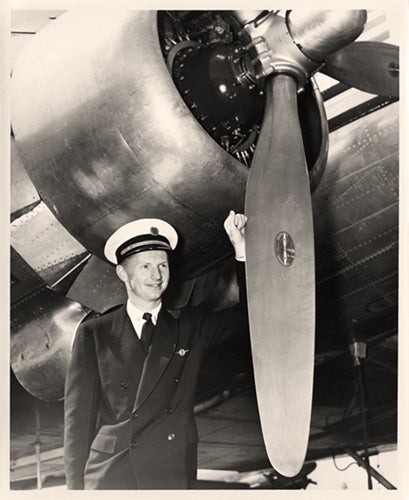
[image]
Pan American Airways Captain Roger J. Sherron, Jr. poses next to a Douglas DC-3 engine 1943
Roger Sherron flew for Pan American World Airways from 1939 until 1976.
Captain Sherron was interviewed in 1999.
“I liked them all, but the DC-3 was really — it was a workhorse. I enjoyed the airplane; I never thought I’d fly it. We got along very well. It was a good airplane. You think you’re the master of the airplane, you can really handle it and you can really make nice smooth landings. And the next thing you know, you come in for a landing, and it would bounce you up in the air just to straighten out your ego a little bit. But this was not anything dangerous, it was a matter of ego-busting, I guess.”
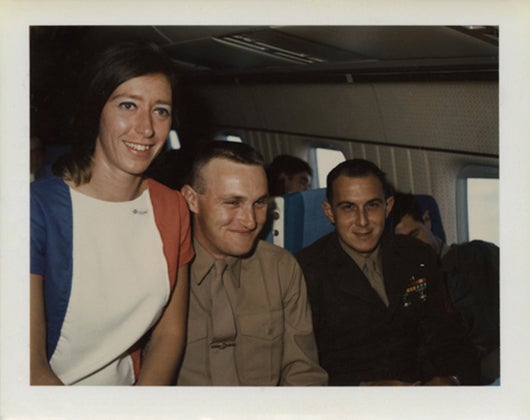
[image]
United Air Lines stewardess Sandra Herrmann poses in aircraft cabin with passengers / service members aboard U.S. Military Airlift Command (MAC) charter flight c. 1968
Sandra Herrmann was a flight attendant for Capital Airlines and United Airlines from 1960 until 1999.
Ms. Herrmann was interviewed in 2020.
“A lot of the flight attendants… sat around and started talking about the difference from the one war to the other, how the troops were treated and how the people were. And then we started talking about our feelings. You go along in life, but all of a sudden, it was a stopping point, and we were all crying, because we didn't realize the emotions that we still carried from Vietnam. We had never talked about it before, and it was amazing. And to this day, if I go to a parade or I see something involving Vietnam, I just start crying. I was told I have a form of PTSD from that. I wasn't in combat or anything like that. But it really affected an awful lot of us emotionally, very much so, and I imagine it always will. I hope I’m a better person because of it in the way I treat others, but it’s something that will be with me the rest of my life.”
Do you want to learn about how airline ticketing worked before computers? Piloting a flying boat over the Pacific Ocean? Meal service through the ages? Airport management? Airline mergers? Women who broke barriers in aviation and airport administration? The worst smell on a cargo flight? (According to Marilyn Breen, flight attendant for Flying Tiger Line, it was strawberries!) All of these experiences and more are available through the transcripts in SFOM’s collection.
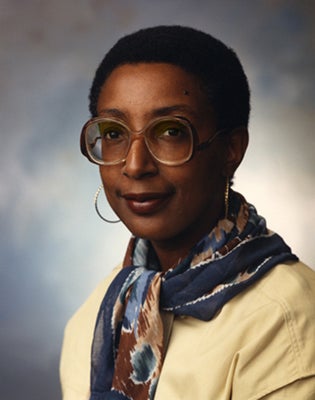
[image]
SFO Deputy Director of Finance Angela Gittens c. 1989
Between 1983 and 2020, Angela Gittens was the Deputy Director of Finance for San Francisco International Airport, CEO for Hartsfield-Jackson Atlanta International Airport and Miami International Airport, and the Director-General for ACI-World.
Ms. Gittens was interviewed in 2021.
“I think fifty years ago, you wouldn't have had airports so focused on the customer experience – the customer being the passenger – because airports saw the airline as their customer, and the passenger was the airlines' customer. But now, airport management sees the passenger as the customer. Also, marketing. The desire of airports, because of their communities, to attract and retain air service for their communities has become, I'll say, priority number two – because safety and security are always number one – but priority number two. And airport managers tend to be judged on their success in attracting and retaining air service for the community, because the air service has become so basic to the economy of the community they serve or the country they serve.”
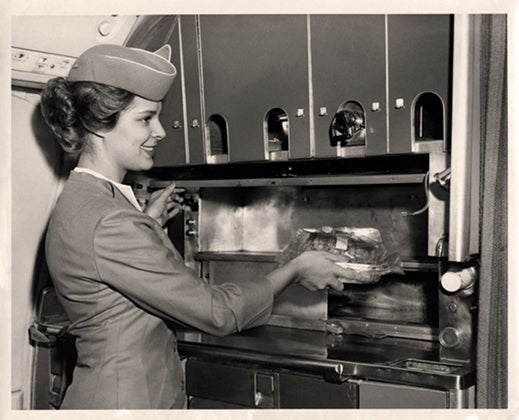
[image]
Pan American World Airways stewardess Pamela (Borgfeldt) Taylor poses in a Boeing 707 galley on her first training flight from New York to Berlin 1964
Pamela Taylor was a flight attendant for Pan American World Airways from 1964 until 1987.
Ms. Taylor was interviewed in 2022.
“We would fly to Hawaii, then Fiji, and then we would pick up the DC-7 there. It was a great trip, because we had plenty of time off. But one thing I do remember in those days, we would scramble eggs for a plane full of people. We’d have maybe seventy-five people to scramble eggs for. You didn't do it one by one. You’d make a big vat of scrambled eggs. You’d crack all the eggs and whip them up, and we had all kinds of special ways to make them look good. One was putting soda water in them, and you wanted to be sure you didn't overcook them, because if you did, they would turn green. You had to make sure it was perfect timing.”
Because the OHP upholds the high standards of the oral history community, many of the interviews are still being prepared for research access. To ensure that the interview reflects the intent of the speaker, both the speaker and the OHP staff edit the transcript before adding it to the permanent collection and making it accessible to the public.
To access interview transcripts, please visit our collections website here and add a comment or question at the bottom of the web page of the interview you’re interested in. SFO Museum does not post interview transcripts online, but individuals can request copies of interviews through the website. Please email curator@flysfo.com for more general questions. And if you’ve worked in commercial aviation and have a story to tell, please contact us!
Debbie Kahn
Museum Registrar and Oral Historian
SFO Museum
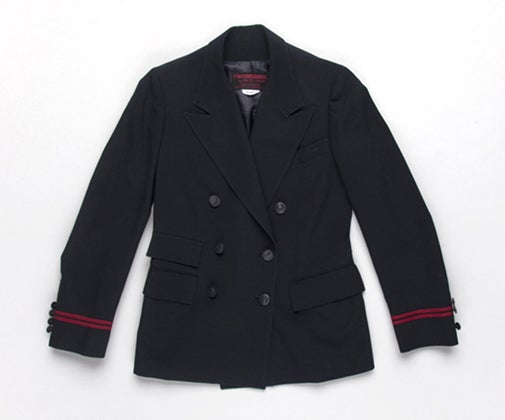
[image]
Jacket worn by Jacquelyn Peterson, TWA flight attendant 1978
Jacquelyn Peterson was a flight attendant with TWA (Trans World Airlines) from 1977 to 1989.
Ms. Peterson was interviewed in 2020.
“I have such fond memories of TWA, such fond memories, and I feel very, very lucky to have been able to be a part of that company during pretty much their heyday. It was really kind of a magical time for me. It was the perfect job for me because of the odd hours, not working nine to five, being able to travel, being able to live in Manhattan. Certainly, I wasn't making that much money, but I loved the lifestyle. And I was lucky because I did have a partner who helped with expenses, so we could take a month off each year to travel. And the benefits, the pass benefits. The benefits on other airlines were good because we got good discounts on other airlines, and I feel very, very fortunate to have worked for them.”